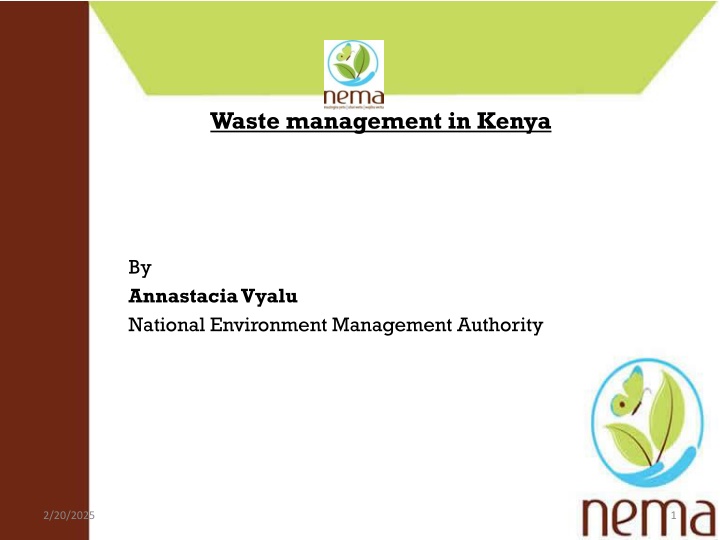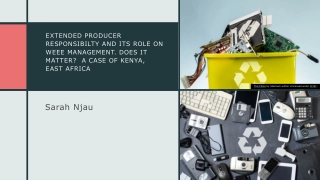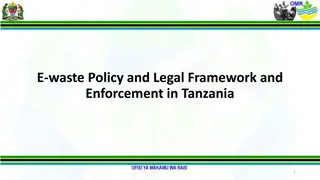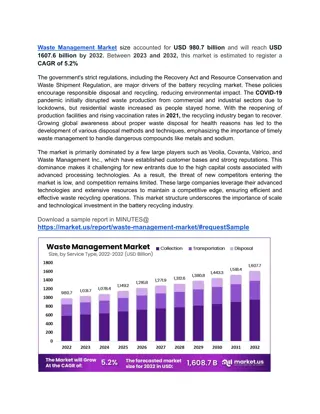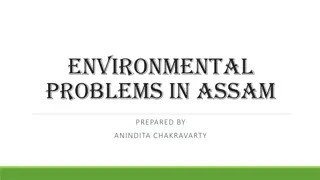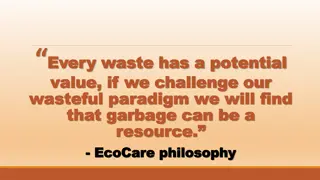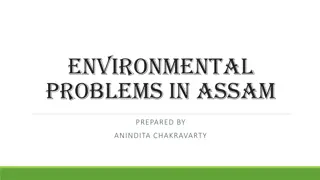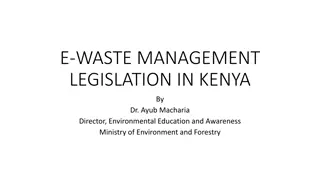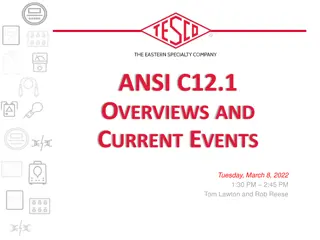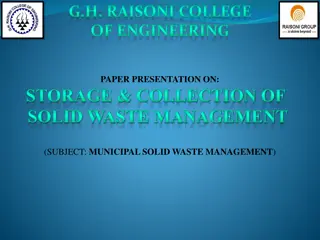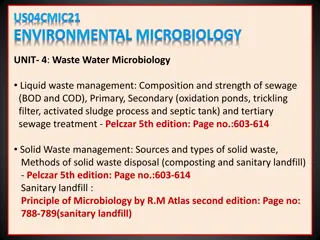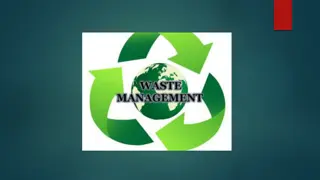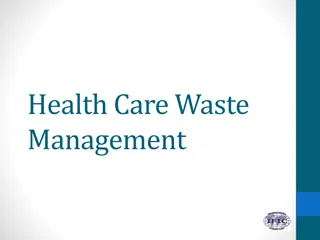Waste Management Policies and Role of NEMA in Kenya
Evolution of waste management policies in Kenya, highlighting key regulations and strategies implemented by National Environment Management Authority (NEMA) to promote sustainable practices, minimize waste generation, and enforce compliance. The role of NEMA in licensing waste service providers and implementing bans on plastic bags for effective waste management and environmental protection.
Download Presentation

Please find below an Image/Link to download the presentation.
The content on the website is provided AS IS for your information and personal use only. It may not be sold, licensed, or shared on other websites without obtaining consent from the author.If you encounter any issues during the download, it is possible that the publisher has removed the file from their server.
You are allowed to download the files provided on this website for personal or commercial use, subject to the condition that they are used lawfully. All files are the property of their respective owners.
The content on the website is provided AS IS for your information and personal use only. It may not be sold, licensed, or shared on other websites without obtaining consent from the author.
E N D
Presentation Transcript
Waste management in Kenya By Annastacia Vyalu National Environment Management Authority 2/20/2025 1
Evolution of the Waste management Kenya Waste Management Policies a) Environmental Management and Coordination Act 1999 prescribes management of hazardous waste in Kenya. b) EMC(Waste management) Regulations 2006 which defines the responsibilities of waste generators, collectors, transporters and standards for disposal facilities. c) National Solid Waste Management Strategy 2015 zero waste principle and minimum requirements for disposal sites. d) National Sustainable waste Management Policy 2021 enshrining Circular Economy Initiatives: e) Sustainable Waste Management Act 2022 which provides for Circular initiatives in waste management. f) The concept of a circular economy, where materials are recycled, reused, and repurposed to minimize waste generation. This involves supporting recycling industries and encouraging product design for easy recyclability. 2/20/2025 2
ROLE OF NEMA Regulation Development: regulations, and guidelines on waste management, setting standards Issuing Permits and Licenses: issue permits and licenses to waste management facilities Monitoring and Enforcement: Monitoring waste management activities to ensure compliance. Enforcement actions: such as issuing fines or shutting down non-compliant operations. Public Awareness and Education: raising public awareness about proper waste management practices. Promoting Recycling and Sustainable Practice adoption of sustainable waste management practices. Waste Minimization and Hazardous Waste Management: 2/20/2025 3
ROLE OF NEMA a) The licensing of waste service providers in the country to ensure effective waste management and environmental protection. b) This process involves regulatory, oversight and authorization to individuals or companies that engage in waste collection, transportation, recycling, disposal, and other related activities. c) The goal is to maintain high standards of waste management, minimize environmental pollution, and promote sustainable practices. d) Application and Eligibility: all Waste service providers must obtain licenses from NEMA. e) Must submit a comprehensive application that outlines their proposed waste management activities. f) The application typically includes details about the type of waste to be managed, methods of collection and disposal, recycling strategies, and other relevant information. 2/20/2025 4
Ban on Plastic Bags a) Ban on plastic bags used for both commercial and household packaging 2017. b) The clearance of primary industrial plastic packaging requires the manufacturers and users of Plastic packaging to put in place takeback schemes. c) The Ban on plastic bags, single use plastic in protected 2018. d) The PET and MoECCF worked on a FoC on management of PET waste and this saw the establishment of PETCO Kenya a producer Responsibility Organization to Manage PET products. e) 2/20/2025 5
Ban on Plastic Bags. The Bakers sector under negotiated compliance established extended producer responsibility scheme namely Kenya Extended Producer Responsibility Organization(KEPRO). KEPRO initial mandate was to execute EPR obligations on behalf of all bakers KEPRO encountered great challenges due to free riding. KEPRO expanded her scope to cover other plastic packaging for non hazardous products. The existence of KEPRO and PETCO without commensurate regulatory framework resulted to a myriad of challenges. 2/20/ 2025 6
Output of the Ban on Plastic Bags. The ban necessitated the establishment of EPR schemes. This led to formation of KEPRO for bread packaging in 2019. The need for legal framework on mandatory EPR. Development of National Sustainable waste Management policy 2021. The Sustainable Waste Management Act 2022. Development of EPR regulations( still in draft awaiting gazetment) to provide for mandatory EPR schemes. EPR schemes including KEHAPRO(for hazardous products), EPROK(Electrical and Electronic Equipment), PAKPRO (for packaging for non hazardous products). 2/20/2025 7
FoC 2018 The FoC which was signed on 17th May 2018 for a period of three years. The responsibility of the private sector under the FoC includes - Manufacturer s responsibility on PET post- consumer waste in the Kenya environment :- a) Establish and implement the agreed Take Back and Extended Producer Responsibility schemes for PET Bottles- PETCO Kenya b) Undertake clean-up activities on PET waste Bottles before the schemes are fully implemented in partnership with the ME&F and relevant agencies. c) Conduct awareness campaigns to support the established schemes implementation, re-cycling, and up-cycling. d) Support research to be undertaken under this Framework of Cooperation. 2/20/2025 8
Waste Management Opportunities Recycling and Resource Recovery: With the increasing amount of waste being generated, there's a significant opportunity for expanding recycling efforts. Organic Waste Management: Organic waste, such as food waste and agricultural residues, can be converted into compost, biogas, or other valuable products. Waste-to-Energy: The conversion of waste into energy, such as electricity or heat, through technologies like incineration or anaerobic 2/20/2025 10
Waste Management Opportunities Waste-to-Energy: The conversion of waste into energy, such as electricity or heat, through technologies like incineration or anaerobic digestion E-waste Management: As technology use grows, so does the generation of electronic waste (e-waste). Proper collection, recycling, and disposal of e-waste can help recover valuable materials and prevent harmful substances from entering the environment. 2/20/2025 11
Waste Management Opportunities Plastic Waste Management: The global concern about plastic pollution provides an opportunity to focus on innovative ways to manage and reduce plastic waste. Waste Collection and Transport: Efficient waste collection and transportation systems are essential for proper waste management. Landfill Management and Rehabilitation: Landfills require proper design, management 2/20/2025 Public Awareness and Education: Raising public awareness about the importance of 12
Waste Management Opportunities Public Awareness and Education: Raising public awareness about the importance of waste reduction Green Jobs Creation: The waste management sector can create employment opportunities Waste Collection Technology: Innovative technologies such as smart waste collection systems Circular Economy Initiatives: Encouraging a circular economy approach involves minimizing waste by designing products for 2/20/2025 13
Waste Management Opportunities Circular Economy Initiatives: Encouraging a circular economy approach involves minimizing waste by designing products for durability, repairability, and recyclability. 2/20/2025 14
THANK YOU 2/20/2025 15
